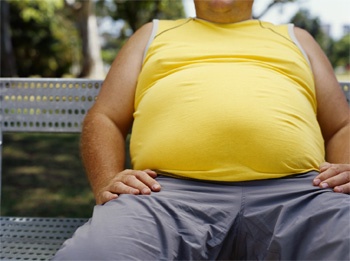Highly intriguing questions such as, why do we consider certain people more attractive than others and how can we lose weight without feeling hungry? – will be answered by University of Aberdeen experts at a key UK science event.
Focusing on their current research into obesity and physical attraction respectively, Dr Alexandra Johnstone from the University of Aberdeen Rowett Institute of Nutrition and Health and Dr Ben Jones and Dr Lisa DeBruine from the University of Aberdeen's Face Research Laboratory, will present at the BA Festival of Science in Liverpool on Monday (8 September).
Entitled Fat bodies of evidence: weighing up the options, Dr Johnstone's presentation, which has been organised by the UK Nutrition Society, will focus on recent research which is developing effective and safe strategies for weight loss. She will discuss her current findings on appetite control and the role of diet composition in controlling our motivation to eat.
Dr Johnstone will don a 'fat apron' as part of her presentation. The suit, which is fashioned in the style of a tabard, has numerous pockets which are filled with 2kg bags of sand to represent weight gain.
Dr Johnstone said: "Our challenge is to help people living in our obesogenic environment, where nutrition and lifestyle choices promote weight gain. Practical advice on how to lose weight and keep it off in the long term are required by developing behavioural strategies that address energy balance - food intake and physical activity - and improve metabolic health - for example blood glucose levels and cholesterol.
"To eat what you want and still lose weight is the ultimate aim or holy grail of dieting. My research has highlighted that feeling hungry is one of the main reasons why people fail to comply with a diet programme. How we can manage our appetite and how diets can be structured to control our motivation to eat, is central to our current research into tackling obesity".
"During the presentation I will also address how we use research to link understanding of our physiology with behaviour in the context of eating".
Dr Jones and Dr DeBruine will highlight the rules of physical attraction in their presentation Faces, words and brains. Examining what makes us more attracted to certain individuals, Dr Jones and Dr DeBruine will showcase their research which shows the extent to which we consider "beautiful" people attractive is actually related to how attracted we believe they are to us.
Dr Jones said: "Previous research on attraction has emphasized the importance of physical characteristics such as facial symmetry or voice pitch. However new findings show that attractiveness is not as straightforward as simply preferring flawless skin or symmetric features – it is a much more complex process.
"Our latest research highlights how social cues, which signal the extent to which others are attracted to you, also play a crucial role in attraction. For example people show stronger preferences for attractive physical cues when judging the faces and voices of people who appear willing to reciprocate this attraction, either by making eye contact, smiling or even by simply stating that they "really like you".
"Combining information about others' physical beauty with information about how attracted they appear to be to you allows people to allocate their social effort efficiently and essentially avoid wasting effort on attractive individuals who appear unlikely to reciprocate."
More about Dr Jones' research can be found at www.facelab.org. To take part in online experiments about attraction visit www.faceresearch.org.
The BA Festival of Science takes place in Liverpool from 6-11 September bringing together over 350 of the UK's top scientists and engineers to discuss the latest developments in science with the public.
In addition to talks and debates at the University of Liverpool, there will be a host of events happening throughout the city as part of the European Capital of Culture celebrations.
For more information about the BA Festival of Science, including an online programme, visit www.the-ba.net/festivalofscience.


